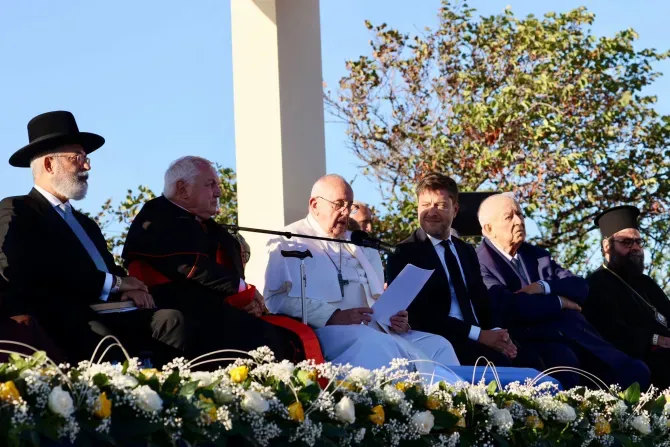
In Marseille on Friday, before a memorial to people lost at sea, Pope Francis said humanity is at a crossroads between fraternity and indifference regarding the migrant crisis.
“We can no longer watch the drama of shipwrecks, caused by the cruel trafficking and the fanaticism of indifference,” he said Sept. 22.
“People who are at risk of drowning when abandoned on the waves must be rescued. It is a duty of humanity; it is a duty of civilization.”
“On the one hand, there is fraternity, which makes the human community flourish with goodness; on the other, indifference, which bloodies the Mediterranean. We find ourselves at a crossroads of civilization.”
The pope spoke during a meeting with local religious leaders at a memorial dedicated to sailors and migrants lost at sea on the first of a two-day visit to Marseille.
“Before us,” he said, “is the sea, a source of life, yet this place evokes the tragedy of shipwrecks, which cause death.”
“We are gathered in memory of those who did not make it, who were not saved. Let us not get used to considering shipwrecks as news stories, and deaths at sea as numbers: No, they are names and surnames, they are faces and stories, they are broken lives and shattered dreams,” he continued.
Francis is in Marseille to participate in the Mediterranean Encounter, the “Rencontres Mediterraneennes” — a gathering of some 120 young people of various creeds with bishops from 30 countries.
The day after the pope’s visit — and the concluding day of the encounter, Sunday, Sept. 24 — is the World Day of Migrants and Refugees.
The first quarter of 2023 was the deadliest since 2017 in the Central Mediterranean, with at least 441 people dying, though that’s considered an undercount. The U.N.’s International Organization for Migration (IOM) calls it a “persisting humanitarian crisis” that is “intolerable.” More than 20,000 people have died on Central Mediterranean migration routes since 2014.
Earlier this year, Pope Francis marked the 10-year anniversary of his first trip as pope: to Lampedusa, an island between Sicily and Tunisia and Libya, and the center of many migrant disasters.
In personal comments with journalists aboard the papal plane from Rome earlier in the day, Pope Francis lamented the “cruelty, a lack of humanity,” on Lampedusa, where hundreds of migrants have arrived almost every day in recent weeks.
The Italian island, which is smaller than eight square miles and has a population of about 6,400, has declared a state of emergency as it struggles to respond to the situation.
“I hope I have the courage to say everything I want to say,” the pope told Spanish journalist Eva Fernández of COPE Radio.
“After the Libyan concentration camps they throw them into the sea,” he said upon seeing a photo of a migrant child who arrived on Lampedusa.
At the memorial, Pope Francis asked for a moment of silence.
“We need to show some humanity: silence, weeping, compassion, and prayer. I now invite you to spend a moment of silence in memory of these brothers and sisters of ours: Let us be moved by their tragedies,” he said.
“God will bless us,” the pope added, “if on land and at sea we know how to take care of the weakest, if we can overcome the paralysis of fear and the disinterest that, with velvet gloves, condemns others to death.”
The memorial to those lost at sea is a Camargue cross, which comes from the Camargue area of France. The design of the cross represents the three theological virtues of faith, hope, and charity. The three tridents represent faith, the anchor represents hope, and the heart represents charity.
